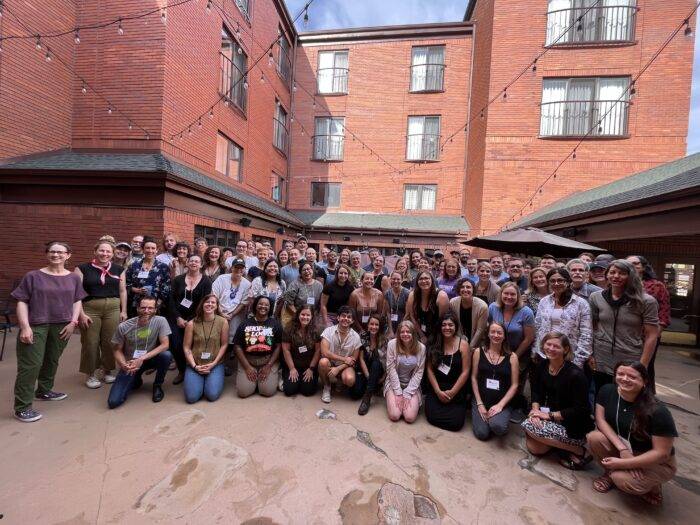

This year’s NSAC Summer Meeting was held last week in sunny (although unusually rainy) Boulder, Colorado. More than 100 members and NSAC staff from across the country gathered at the foothills of the Rockies to re-energize and strategize ahead of the upcoming Farm Bill reauthorization.
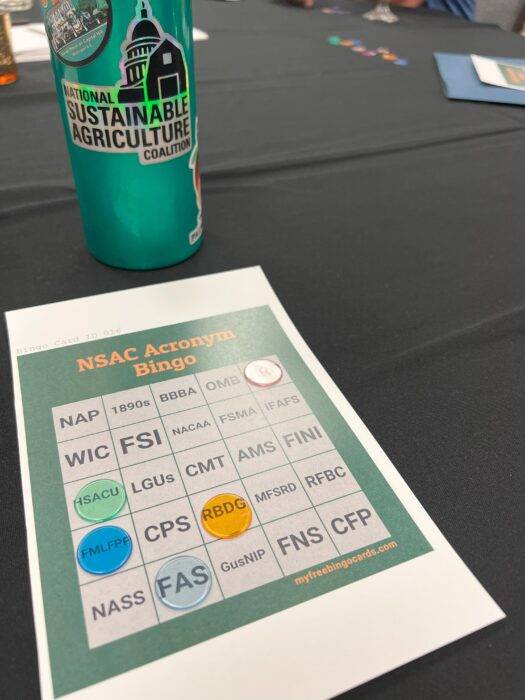
Summer Meeting is one of two annual opportunities when NSAC’s nearly 150 member organizations come together in person to discuss the Coalition’s policy and grassroots priorities for the year. At more than 5,000 feet above sea level and with its endless opportunities for outdoor adventure and good food, Boulder was the perfect backdrop to get down to coalition business. NSAC members had the opportunity to participate in plenary, breakout, and panel sessions around key campaign priorities including Climate and Agriculture, the Farm Safety Net, and Resilient Local and Regional Food Systems, engage in racial equity caucusing, and solidify commitments for grassroots action. We also held time to build connections among members through dinners, happy hours, farm tours, an early morning high-elevation group run, and a heated round of NSAC Acronym Bingo.
Building Connections
The meeting was an excellent chance to forge relationships with key partners and allies in the sustainable agriculture and food movement, to further inform our work and strategy and Boulder was the perfect setting to dig into this work. Boulder and its surrounding areas were the traditional territories and ancestral homelands of the Cheyenne, Arapaho, Ute, and many other Native American nations. Their devastating treatment by colonists and their eventual forced removal from these territories by white settlers caused lasting impacts indicative of many of the structural problems that still plague the food system. It was fitting to meet there as a coalition – to learn, discuss, and strategize around addressing many of the racial equity issues most affecting farmers, ranchers, workers, and communities today.
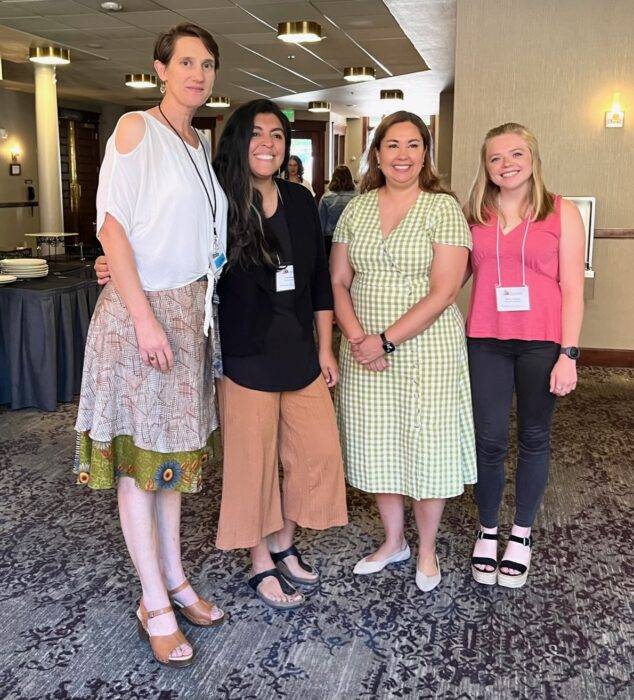
This year’s summer meeting provided important opportunities to hear from local leaders in Colorado. To kick things off, on Monday, in between plenaries, NSAC was fortunate to be joined by Representative Yadira Caraveo (D-CO-8) who spoke to members about what she has done in her first six months in office, and as a new member of the House Agriculture Committee, to take a systems-based approach to food and farming. She discussed some of the challenges in her district and elsewhere as it becomes increasingly difficult to produce good food. As a pediatrician, Rep. Caraveo has a strong interest in community health, child nutrition, addressing food instability, and looking at “food as medicine.” In the Q&A portion, Rep. Caraveo responded to questions about some of the barriers producers face in accessing federal programs and what is being done to address water rights, particularly for young farmers and farmers of color.
On Tuesday evening, Representative Joe Neguse (D-CO-2) joined us at dinner at Ollin Farms (more on the farm tours below). Representative Neguse talked about the climate crisis as an existential threat and the urgent need to invest in protecting our resources for future generations. He noted that healthy soils are one of the most potent tools for mitigating climate change and building resilience.
On Wednesday, two speakers joined us at the Boulderado for a “Water in the West Panel” which delved into key environmental justice principles surrounding water rights in the region. The first speaker, Michelle Gabrieloff-Parish, has more than twenty years of experience uniting the fields of sustainability, justice, culture, and nature. Michelle serves on the Colorado Water Equity Partnership, the advisory board for Frontline Farming, and was recently appointed to the new State of Colorado “Biochar for Oil and Gas Plugging” Working Advisory Group. As founder of the “Once and Future Green”, Michelle trains and consults Frontline communities, governments, and philanthropy to forward community-driven solutions with transformative anti-oppression and ecological design tools. Michelle underscored the importance of community-led efforts to protect natural resources, like the Colorado River, and the urgent need to have community voices at the table to create lasting solutions. She discussed the importance of institutions relinquishing control, giving it to the communities most impacted by climate change and inequitable management, because these front-line communities, and especially communities of color across the world, have legacies of leadership when it comes to sustainability and stewarding land for thousands of years.
The second speaker was Gregor MacGregor, J.D., a Teaching Assistant Professor at the University of Colorado who teaches courses on environmental and natural resources policy and law. We learned about the project he directs – the Acequia (“Ah-Say-Key-Ah”) Project, a pro bono effort to provide Hispano irrigators in southern Colorado with legal services related to their land, water rights, and businesses. Outside of the University he owns and operates a cottage-food business, Vulcan Mine Bakery, where he bakes and provides free business consultations for rural redevelopment initiatives.
Out in the Field
On Tuesday, we continued the tradition of summer farm tours, which are always an important opportunity to connect members with the experiences, insights, and wisdom of local producers and food systems professionals. Here are snapshots from those visits:
Sister Gardens is a vegetable, herb, and flower garden on more than one acre of land within the Aria Denver development. A disused orchard that had been stewarded by the Sisters of St. Francis since 1938, Sister Gardens has become a bustling site of food production and also of reawakened community cultivation. The gardens are designed as a terraced area – an ancient practice from the times of the Hanging Gardens of Babylon to Machu Picchu in the Incan Empire. Terracing is an ancestral, regenerative system that captures nutrients at different levels of runoff and decreases erosion and nutrient leaching. We learned that the garden is home to Black, Indigenous, and People of Color (BIPOC) foodways that serve as an archive of seeds for African, Middle Eastern, and Four Corners bio-regional terraces, to protect culturally rooted, regionally adapted foods. Sister Gardens is one site that forms part of Frontline Farming, an organization that works to create greater equity across the food system on Colorado’s Front Range. They support and create leadership and access for women and people of color by growing food, listening, educating, honoring land and ancestors, engaging in policy initiatives, and taking direct action.
At the East Denver Food Hub, NSAC members had an opportunity to tour the facilities and learn about their innovative model for local food aggregation and distribution that supports local farmers and producers and ensures healthy food access for communities across the greater-Denver region and beyond. Founded in 2020, East Denver Food Hub is a social enterprise that builds relationships with wholesalers, retail markets, and institutional partners to demystify the supply chain, address food insecurity, support the viability of local agriculture, and develop community wealth creation initiatives that promote economic justice. We learned about how their model is addressing some of the most significant challenges facing farmers, producers, and distributors, as well as low-income communities facing food insecurity. By taking a holistic, systems approach that addresses racial equity and climate change, East Denver Food Hub is a true pioneer in values-based food procurement.
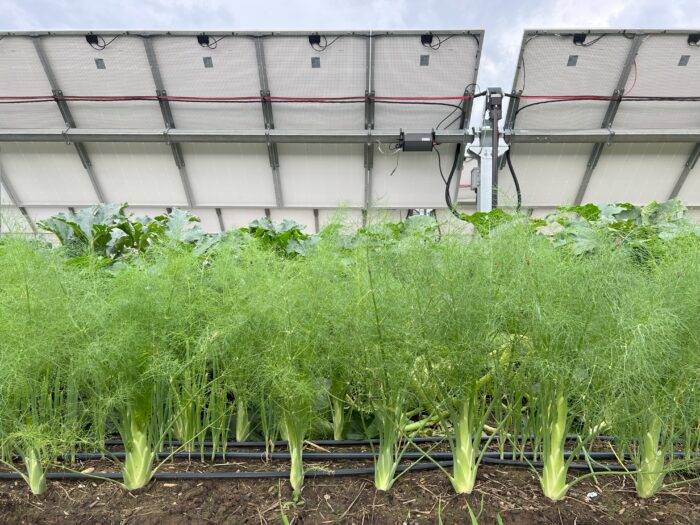
Jack’s Solar Farm is the largest active produce-producing agrivoltaics project in the United States, (some grazing-based arrays can be larger.) Jack’s powers hundreds of homes while producing a diverse array of fresh veggies for local markets. They are doing ongoing and important research into crop varieties, yields, soil health, and much more in the context of co-locating solar panels and food production. NSAC members learned about their trialing of crops, how they manage the soil using no-till to account for narrower aisles due to the panels, and how they adjusted the solar panels to accommodate vegetable production. For example, they are elevated a bit higher than traditional arrays to allow for more light to get to the plants. This was a particularly timely visit given that the Agrivoltaics Research and Demonstration bill would expand our understanding of the requirements of agrivoltaics systems in different ecosystems, and allow for better agronomic decisions under panels as well as better design of the associated photovoltaics systems. It would also create a set of demonstration sites that would show farmers and solar developers the best options for systems in various ecosystems.
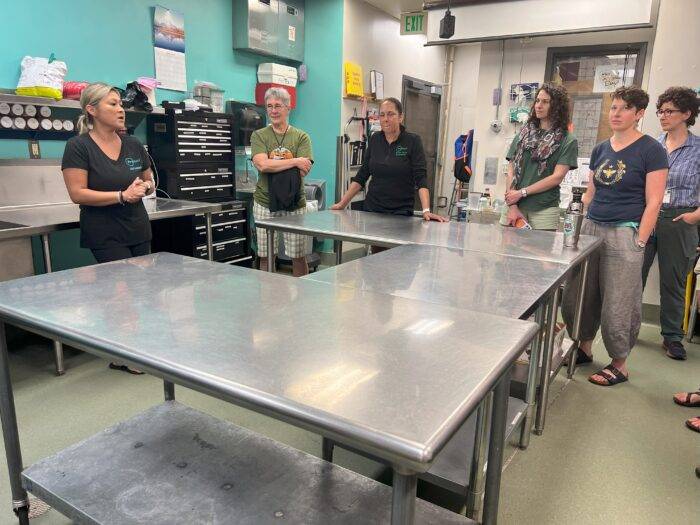
At the St. Vrain School District, we learned about St. Vrain’s innovative wide-ranging experiential learning programming, which includes livestock, greenhouse production, and culinary arts. We learned about their local sourcing and procurement for their school meals. They are procuring a wide array of fresh produce and locally made products like tortillas for their school lunch program, bolstering the local economy and community connections with growers and local food businesses.
The farm tours culminated with a beautiful farm-to-table experience at Ollin Farms in Longmont, Colorado. Members huddled under a covered pavilion for live music, farm-fresh food, and local brew from Odd13 Brewing, while the rain poured down. Ollin Farms is run by farmers Kena and Mark who believe deeply in the principles of sustainable agriculture. The goal of their family farm is to produce top-quality farm products while increasing the diversity and health of the ecosystem. Mark passionately addressed the group giving some history about the farm, its founding, and the struggles they faced, particularly during the COVID-19 pandemic. Ollin Farms is working to build a resilient food system in Boulder County. They do this through community engagement and education, hosting interns, offering classes, and field trips, sourcing to local school districts, and collaborating with scientists to track ecosystem data on the farm. They also have a farm stand.
Mark explained that they grow their produce without pesticides or herbicides as it is the soil that will determine the health of everything that grows out of it. After Mark spoke, the rain stopped and a rainbow appeared overhead as members explored the cottonwoods of Left Hand Creek where the farm sits and witnessed firsthand the nutrient-dense farming model founded on getting the right nutrients, in the right proportions to generate active, living soil.
Homeward Bound
After three days of hard work and idea-sharing, NSAC is grateful to our members for traveling to be with us and also for their longstanding commitment and dedication to the sustainable agriculture movement. We would like to thank the team at Nourish Colorado for helping to make the Colorado meeting possible (and reminding us to drink water and wear sunscreen,) and for facilitating introductions to a range of inspiring partners in the movement. Thank you to our panel speakers, farm tour hosts, the Colorado Members of Congress who joined us, the caring staff at the historic Hotel Boulderado, and of course to our superb meeting planners: Carena Miles, NSAC’s operations manager, and Tiffany Guinn, events consultant extraordinaire.
The post NSAC Heads to the Rockies – A Summer Meeting Recap appeared first on National Sustainable Agriculture Coalition.